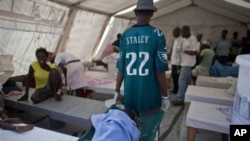The World Health Organization reports the number of cholera cases continues to grow in Haiti, but a smaller proportion of people are now dying from the disease. Latest official figures put the number of deaths at nearly 1,900 and more than 84,000 cases.
When the epidemic erupted in Haiti in October, the proportion of hospitalized patients dying of cholera was as high as nine percent. Latest reports from Haiti's Ministry of Health finds that figure is down to 3.5 percent.
But, this is no reason to cheer. The World Health Organization reports all 10 of Haiti's provinces now are affected to some degree. Also, it says cholera figures significantly underestimate the true toll of the epidemic because of gaps in case reporting.
Assistant Director-General of WHO's Health Action in Crises, Eric Laroche has just returned from Haiti. He says it is difficult to know precisely how the epidemic is evolving. He says it is likely to peak in some places in a few weeks, while it may take months to peak in other places.
"We are using a planning figure of 400,000 cases over the first 12 months of the outbreak,' Laroche said. "And, half of these cases, which means 200,000 will be happening in the first three months of the outbreak. We think it is important to investigate into how this outbreak started and what strain of the cholera is spreading in the country."
UN and non-governmental agencies have come in for criticism regarding their tardy and lackluster response to the epidemic. Dr. LaRoche agrees there have been problems and says WHO and others are looking at what might have been done differently or better.
At the same time, he says it is important to keep focused on the major task of saving lives and making sure the sick are treated.
"This disease, as I said, needs a very high level of assistance in terms of staff assistance-not only doctors, but particularly nurses, particularly the simple agents who are going to wash the beds and clean the places and put the chlorine in proper places," said Laroche.
Dr. Laroche says there is a need for 350 doctors, 2000 nurses, 2,200 support staff and 30,000 community-based workers. In addition, he says it is important to do more awareness campaigns in the communities so people know how they can avoid infection if possible.
He says there also is a need for more access to clean water, hygiene and sanitation. He says every community should have a re-hydration center to quickly treat people with cholera.
Haiti: More Cholera Cases, Fewer Deaths




